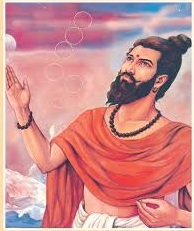Kanad (कणाद) was a sage, an ancient Indian natural scientist and the philosopher who founded the Vaisheshika school of Indian philosophy that also represents the earliest Indian physics. He is believed to have lived between the 6th – 2nd BCE also known as Kashyapa, Uluka, Kananda and Kanabhuk.
He is known for laying the foundations of an atomic naturalism Indian philosophy in the Sanskrit text Vaisheshika Sutra. He suggested that everything can be subdivided, but this process of subdivision cannot go on eternally, and there must be the smallest entities (Parmanu) that cannot be further divided, that are eternal, that aggregate in different ways to yield complex substances and bodies with a unique identity, a process that involves heat, and this is the basis for all material existence.
He used the above ideas with the concept of Atman (soul, Self) to develop a non-theistic means to moksha.
